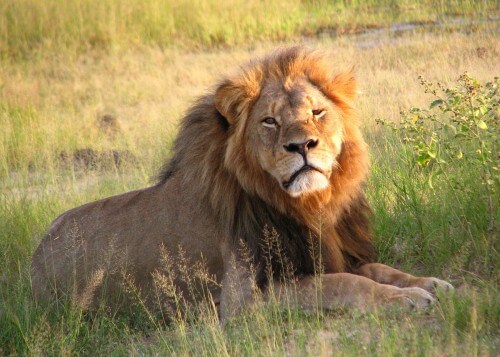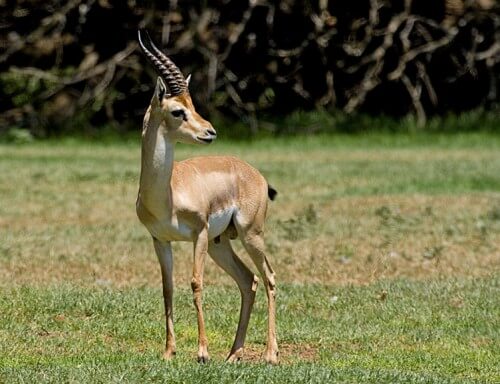Cecil the lion is not alone: hundreds of rare wild animals are hunted completely legally around the world every year. Is sport hunting actually beneficial to wildlife, and what are the chances that we will see such a hunt in Israel?

"And there we saw in the distance the mother shepherd with her two cubs, a male and a female. Wieland was very tired from running after them, and moment by moment his knees failed. So he made up his mind and decided to catch the bear in any way he could. He cocked his gun and shot one puppy. When the mother saw that one of her sons had fallen, covered in his blood, she left the dead puppy and ran like an arrow from a bow, and with a terrible and heart-shaking growl - straight to Wieland. That's how the bear came within five meters of killing her son, and already stretched out her arms for the well-known 'hug of love'. However, Salim saw this from afar, and appeared as a savior angel at the right moment: the large bullet that came out of his rifle, wide-barreled and ancient, cracked her throat and threw her to the ground."
This hunting scene is not taken from the diary of a 19th century British adventurer. This is the story of the killing of the last Syrian bear in the Land of Israel, in 1917 in Hermon, as it is presented in the memoirs of the pioneer of Israeli zoology Israel Aharoni. Wild hunting eliminated most of the large wild animals that roamed the country until the beginning of the 20th century, and illegal hunting continues to threaten wild animals in Israel even today. Meanwhile, around the world a controversial approach is being taken to raise money for wildlife, allowing hunters to hunt endangered animals for tens of thousands of dollars. The story of the killing of Cecil the lion in Zimbabwe last week once again brought to the headlines the discussion about "sport hunting", and the question of whether it makes sense to allow the hunting of wild animals in a world where they are in increasing danger.
Dentist in Savannah

Hunting has accompanied man since the dawn of his existence. For 99.9 percent of its history man was a hunter-gatherer, so it's no wonder that hunting scenes adorn the walls of prehistoric cave dwellers around the world. Even in the last hundreds of years, an extensive tradition of hunting survived around the world. It was attended by adventurers such as the writer Ernest Hemingway, heads of state such as US President Theodore Roosevelt and King Juan Carlos of Spain and many others, who proudly posed for pictures next to the corpses of rhinos, lions and elephants in one African savanna or another. But what used to be a symbol of male power is now considered a controversial fact. Juan Carlos' expensive hunting trips, for example, were a significant trigger in his way to pass the crown to his son.
The lion known as Cecil, one of Zimbabwe's national symbols, was killed about a week ago by an American hunter in the Hwange National Nature Reserve. He died in a particularly brutal way: the hunter and his companions lured him out of the reserve by tying a bloody corpse to their jeep. After they took him out of the reserve, the American hunter shot him with a bow and arrow. For two days, the wounded Cecil managed to elude the hunter, until finally he was shot by him and his head was cut off. His body remained in the field.
Cecil's death arouses the masses around the world. The fact that the national symbol of Zimbabwe, a backward dictatorship in the southern continent of Africa, killed an American dentist named Walter Palmer, a member of a nation that claims to lead the global fight for nature conservation and climate change, also contributed to this. Had he killed Cecil, a member of a local indigenous tribe, who wanted to provide valuable food for his family, the story may never have reached Western ears. But Cecil was killed by a foreign citizen who paid 55 thousand dollars for that. With all the sadness over the tragic death of Cecil, an impressive male lion with a golden-black mane, his death may have managed to bring into discussion one of the most controversial phenomena concerning wildlife conservation, which is apparently completely legal and takes place in Africa and other parts of the world every day.
Legal but stinks
Cecil was hunted as part of an activity known as "sport hunting" (Trophy hunting). The foreign name of the "sport" hints at its purpose: apart from the thrill of the hunt itself, the hunter gets to decorate his house, or his hunting cabin, with a prize in the shape of the stuffed head of the hunted animal. Sport hunting is a legal and supervised activity, which is regulated by local and international regulations. This is a legal action, which requires a lot of bureaucracy and is expensive, but is very widespread in the world. The process begins with the purchase of a hunting license in the destination country, usually in Africa; continues to rent equipment and guides who are familiar with the designated nature reserve; and ends with receiving permission to transfer the "prize" - the body parts - back home, a permission issued by the International Committee on Trafficking in Endangered Species (CITES).
The enormous dimensions of the phenomenon are evidenced by the fact that between 2009-2013, 1,962 lion parts were transferred from Africa to the USA alone. But not only lions are hunted as part of sport hunting: alongside them, elephants, rhinoceroses, hippopotamuses and crocodiles are also popular. Last December, for example, the right to hunt a black rhinoceros in Namibia was purchased for an unimaginable sum of 350 dollars.
Hunt for science
Cecil the lion was not only a national symbol, but also part of a scientific research project of the University of Oxford. Cecil was tagged with a collar with a satellite transmitter on it, which was originally intended to gather information about his life and habits, and eventually helped in finding his body as well. Ironically, it now turns out that part of the Oxford University's lion research budget comes from the international hunting organization DSC (Dallas Safari Club), which announced that in the last five years it has donated five million dollars to conservation, awareness and prevention of illegal hunting initiatives around the world. Legal hunters boast that their valuable hobby is helping developing countries step up enforcement efforts against illegal hunting; The wildlife conservation organizations, on the other hand, claim that most of the money from the hunting industry ends up in the hands of senior officials in corrupt governments.
Studies conducted in recent years show mixed results regarding the effect of sport hunting on wildlife. A study conducted by the International Union for Conservation of Nature It shows that in areas where sport hunting took place, conservation efforts were less effective and the animals were more exposed to external pressures. A report prepared for the African Coalition for the Lion It also showed that only three percent of the money raised through hunting helps support local populations, who used to hunt for a living in the past. On the other hand, organizations that deal with the preservation of wild animals in Africa continue to claim that sport hunting is a very effective way of raising funds for the cause for which they work.
night war

In Israel there is no legal activity of "sport hunting" of wild animals. The only hunting that is allowed in Israel is the hunting of several species of ducks, which is possible during the hunting season that stretches from September to January. Before the hunting season, notices are published in the press that regulate the firearms, hunting methods and species of ducks allowed. In addition to this hunt, spot permits are occasionally issued to hunt wild boar. These permits make it possible to thin out the wild boar population in places where they cause damage to farmers. In this hunt as well, the hunters are required to report the loot. Dr. Noam Lider, Director of the Ecology Division at the Nature and Parks Authority, explains that wild boars damage crops in the fields and even prey on deer, so it is important to regulate their population as part of preserving the ecosystem and preventing damage to agriculture. The "natural" thinning of wild boars by means of large predators does not exist in Israel, because, as mentioned, they became extinct a long time ago.
But what worries Lider and the inspectors of the Nature and Parks Authority in particular is the illegal hunting, which in some cases creates a real threat to the wild animals in the country. The Haaretz-Israeli deer population, for example, numbers only 2,000 individuals according to the latest count, and these are consistently threatened by the reduction of natural habitats and illegal hunting. "Deer meat is expensive, and the illegal hunters sell it for NIS 1,500 per deer," Lider explains. "The low fines they receive in case they are caught do not deter them from continuing to hunt." Along with deer hunting, porcupines are hunted for food by Druze hunters in the north, as well as partridge hunting and reptile hunting by Thai workers. The struggle between the PA inspectors and the hunters has already escalated to the level of a real war, in which the parties use advanced technological means such as night vision binoculars and satellite navigation systems, alongside "primitive" but effective means of hunting with Saluki dogs, which is common in the Bedouin diaspora, or using improvised traps, which is common among The workers from Thailand. "It is a struggle that takes place every night and that is still in progress," says Lider.
Only in Africa
In Israel there is no tradition of hunting, as can be found in the USA or the British colonies in Africa. Therefore, it is not surprising that the main groups that engage in illegal hunting in Israel today are members of societies that have a hunting tradition - the Druze, the Bedouins and the Thais. Is sport hunting something that can also help preserve local wildlife? "Fortunately, we are not exposed to this dilemma," says Lider. "When you are in a crisis of preserving biodiversity like in Africa, measures of issuing licenses for sport hunting come into consideration. There is no tradition of sport hunting in Israel, but we have other significant problems, chief among them the fight against illegal hunting."
Cecil's death meanwhile developed into a legal battle between Zimbabwe and the United States over the dentist's extradition. Even if he is caught and tried, it is appropriate that the case should turn the world's attention to the hunted, and not to the hunter.
In the same topic on the science website:
